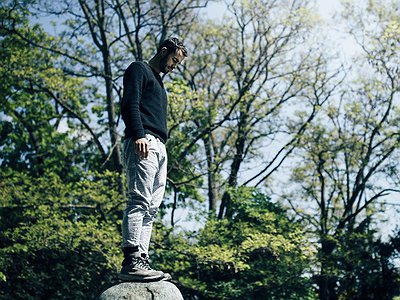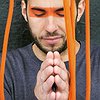Could you take us through a day in your life, from a possible morning routine through to your work? Do you have a fixed schedule? How do music and other aspects of your life feed back into each other - do you separate them or instead try to make them blend seamlessly?
I seem to have two different kinds of days: on-tour and off-tour. The on-tour days usually go like this: wake up, travel, soundcheck, dinner, show, sleep. In between there is some time for food and if possible some physical activity. When I'm not on tour, I usually have quite a lot of freedom to plan my day and there is no fixed order of events. On a regular off-day there is some kind of sport happening (hiking / climbing when I'm in the Alps, or running when in London), and usually also music in some form, either composing/recording or practising for the next tour. I also try to eat well. And somehow every day I end up spending too many hours sitting in front of a laptop, but interviews are fun.
Could you describe your creative process on the basis of a piece or album that's particularly dear to you, please? Where did the ideas come from, how were they transformed in your mind, what did you start with and how do you refine these beginnings into the finished work of art?
At the moment I can only think of my new (and first) film 'Parasol Peak'. It was a massive project and the seven musicians (including myself) literally had a big mountain to climb. It started with a small solo performance video that I made in the Alps three years ago. That short clip was very successful and we had a good vibe with the director who does a lot of outdoor/sports films, so the idea for something bigger was born. As a composer I try to do things that no one else has done before, similar to many extreme mountaineers. We decided to keep the music purely acoustic, so I needed to find an ensemble of musicians who are also good mountaineers and are able to carry their instruments while climbing, so basically no grand piano, harp or double bass. I ended up with 7 great instruments, but quite a random instrumentation. In the following weeks I went location scouting because we wanted to perform the music in very special, remote, and partly extreme places. Those mountain hikes gave me a lot of creative input. I took special attention to the sounds of nature and also experimented with my mountaineering equipment. Ice axes, helmets, carabiners and walking poles all turned into percussion instruments. Having a fixed ensemble and certain locations where we couldn't properly see or hear each other, was restricting but restrictions gave the music a direction and a new sound that I haven't created before. One worry I had was that the film could look like a sports film but not have the right artistic look, so I brought Jeb Hardwick into the team. He's an amazing music video creator and had done one video for me before. He ended up doing the post production for Parasol Peak and gave the film the right look. I think one important element of any creative process is bringing in the right people and in this case I was really fortunate that all 15 people (7 musicians, 8 film/sound crew) worked together really well and I think we achieved something unique.
There are many descriptions of the ideal state of mind for being creative. What is it like for you? What supports this ideal state of mind and what are distractions? Are there strategies to enter into this state more easily?
I'm way more creative if I'm not looking into my phone or laptop. Ideas come to me when I'm walking, jogging, waiting for bus or sitting on a plane. At the computer or with my instruments I often develop the ideas, but it's hard to plan the arrival of ideas. All I know is that they arrive more often when I'm not staring into a screen.
How is playing live and writing music in the studio connected? What do you achieve and draw from each experience personally? How do you see the relationship between improvisation and composition in this regard?
In the studio you have endless possibilities. You can play a take as often as you want (if time/budget allows) and combine an infinite amount of sounds and instruments. In a live situation you are restricted to the people and instruments on stage and you only get one take, and I actually really like that, it's more in the moment.
How do you see the relationship between the 'sound' aspects of music and the 'composition' aspects? How do you work with sound and timbre to meet certain production ideas and in which way can certain sounds already take on compositional qualities?
That's an interesting question. When I started writing music, it was all about rhythm, melody and harmony. Only more recently, I guess when starting to you more electronics, I started thinking about sound and orchestration in more detail. It's a great parameter in music that definitely adds another dimension and opens up a lot of doors for creativity.
Our sense of hearing shares intriguing connections to other senses. From your experience, what are some of the most inspiring overlaps between different senses - and what do they tell us about the way our senses work? What happens to sound at its outermost borders?
One example that immediately comes to my mind is the 'buttkicker'. When I play electronic drums and use in-ear headphones, I usually also have a drum stool that vibrates when I play low bassy sounds (which is called 'buttkicker'). Feeling that vibration in my body, totally gives me the impression that I hear the bass, but in reality I just feel it.
Art can be a purpose in its own right, but it can also directly feed back into everyday life, take on a social and political role and lead to more engagement. Can you describe your approach to art and being an artist?
When I started performing, it was all about the music. I didn't really think about any other aspects of being an artist. But the older I get, the more I see a responsibility to inspire other people and also to use my profile to share a message. My recent project is very nature-connected and I feel very connected to that path and protecting our planet.
It is remarkable, in a way, that we have arrived in the 21st century with the basic concept of music still intact. Do you have a vision of music, an idea of what music could be beyond its current form?
I'm not too worried about music. It has gone through some amazing periods and I'm sure we have great times ahead. But the way people listen to music will keep changing.



